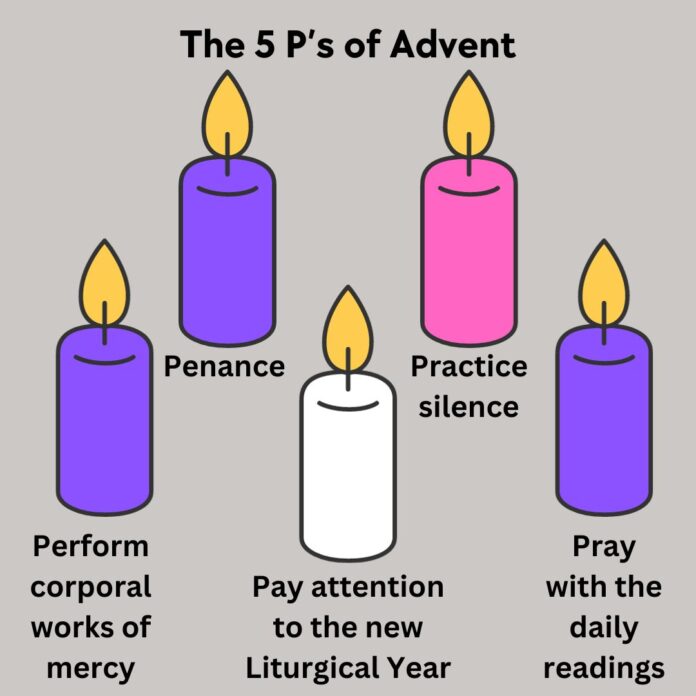At the end of the semester, our poverty of time becomes more apparent than ever. However, in a unique way this year, the upcoming season of Advent further reveals our absolute poverty of time.
With Dec. 25 falling on a Monday, the 4th Sunday of Advent and Christmas Eve are crammed into the same 24 hours. It feels like we’re cheated out of an entire week of Advent.
And yet, the limitation of time in Advent and at the end of this semester reveals that time is a radically gratuitous gift. There is not a second of our lives that we deserve. Rather, we are held in existence by Love, utterly dependent on our Father for every breath, every moment in being.
The season of Advent is a season in which we meditate on time past, time future and the fleeting but invaluable gift of time present. It wraps the whole order of time into a mystical rose that reveals and cradles the One who is the answer to the deepest ache of our hearts.
Advent commemorates and invites the faithful to enter into that agonizing time of waiting when the whole world groaned for a savior. It strains forward to the time when Christ will return in glory and make all things new.
But Advent also prepares us for that moment when Christ “make[s]… new Nazareths in us,” to quote the Jesuit poet, Gerard Manley Hopkins. It is an invitation to cultivate in silence and stillness my awareness of the truth that the timeless God entered my world because He loves me. He would willingly suffer all the darkness of this fallen, twisted world if I was the only soul in need of redemption.
Our Beloved comes to us in poverty, so that we need not fear the poverty of our own lives. However poor our preparation may be in this short Advent, Christ has promised that He will quickly come. In the words of Tolkien, “All we have to decide is what to do with the time that is given to us” over these next three weeks. So what are some ways that we can fully embrace Advent even in the end-of-semester chaos?
It’s beautiful to treat this Sunday like the new year that it is. Take some time to examine the last liturgical year. What are the blessings and unique graces that our Lord has lavished on you? What are the crosses He has carried alongside you? What resolutions do you have in this new liturgical year?
In Advent, we walk alongside Mary in awe of the unspoken Word in her womb. What are ways you can enter into deeper silence so as to hear the heartbeat of the Savior enclosed beneath Mary’s heart?
Can you turn off the music in your car or during your morning routine? Can you spend just a few more minutes in the chapel, sitting before the tabernacle and letting His perfect love still your fearful thoughts?
Advent is also an invitation to remember that our Lord’s love satisfies us in a way that earthly things never can. Can you fast a couple times a week or give up dessert, social media or the snooze button like you might in Lent?
How is the Holy Spirit inviting you to practice the corporal and spiritual works of mercy in Advent so that you can prepare for Christ’s second coming by loving Him in the least of His brethren? What are tangible steps you can take to serve your family when you return home in just a few short weeks?
Advent always flies by, and this Advent will be even quicker than usual. But the Church is merciful in giving us a final boost in our Christmas preparations through the “O Antiphons” in the Liturgy of the Hours. In the eight days leading up to Christmas Eve, the Magnificat antiphons explore different names for Christ, like “Wisdom,” “Adonai,” “Flower of Jesse,” or – my favorite – “Radiant Dawn.”
These antiphons build anticipation and love in the hearts of the faithful through the mysterious names and through that simple gasp of awe and yearning, “Oh!” Advent is a beautiful opportunity to revel in the Liturgy of the Hours, entering into the joy of the Bride awaiting the coming of the Bridegroom.
In “Four Quartets,” T.S. Eliot writes, “So the darkness shall be the light and the stillness the dancing.” In the poverty and exhaustion at the end of the year, the Lord invites us to enter into His silent dance in the waters of Mary’s womb, to be unafraid of the darkness as we wait for the true Light to enter into the world. Maranatha! Come, Lord Jesus!
